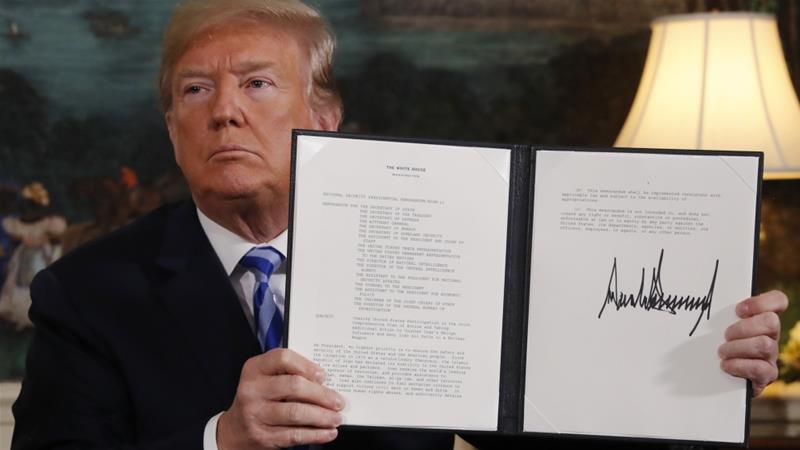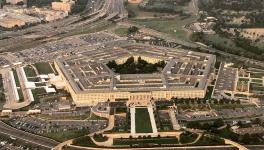Trump’s withdrawal from Iran nuclear deal sparks off instability in West Asia

Uncertainty looms over the future of the Iran nuclear deal, as President Donald Trump announced yesterday the withdrawal of the US from the agreement. Leaders of European countries and the UK had been scrambling over the past few days to convince Trump to not sabotage the hard-won deal. However, refusing to heed their pleas, Trump announced his decision days before the May 12 deadline he had set for the other signatories to accept his amendments to the deal.
Known as Joint Comprehensive Plan of Action (JCPOA), the deal, which was signed in 2015 between Iran and the five permanent members of the UN Security Council - the US, UK, France, China and Russia - in addition to Germany, restricted uranium enrichment by Iran until 2025, and allowed for a continuation of the ban on the import of ballistic missile technology by Iran for up to 8 years.
Trump had demanded that the JCPOA must be expanded to include a restriction on Iran’s indigenous development of ballistic missile technology. He also sought to permanently deny Iran the possibility of uranium enrichment and to restrict the country’s role in Syria and other parts of West Asia, where its interests are antagonistic to the agenda of American allies - Saudi Arabia and Israel.
However, Iran had refused to renegotiate the deal on the grounds that the proposed amendments seek not simply to prevent Iran from acquiring nuclear weapons (a purpose which the JCPOA in its current form was already serving), but to weaken the country’s security apparatus and limit its influence. Russia and China had firmly backed Iran, while leaders of the EU and the UK had pointed out that Iran had not violated any of the terms set in JCPOA.
Iran prepares for eventualities
After Trump’s announcement, Iran's President Hassan Rouhani announced, “I have ordered the Atomic Energy Organisation of Iran to be ready for action if needed, so that if necessary, we can resume our enrichment on an industrial level without any limitations.”
Trump’s announcement will also increase the internal pressure on Rouhani, who has held at bay hardliners who have for long urged the withdrawal of the country from the agreement, and the pursuit of nuclear weapons. However, Rouhani clarified that before resuming uranium enrichment, he would hold consultations with the other signatories to see if the deal’s provisions could be kept intact. “If we achieve the deal's goals in cooperation with other members of the deal, it will remain in place,” he said.
Iranian Foreign Minister Mohammad Javad Zarif said that if all the benefits the deal offers to Iran in return for giving up its nuclear programme can preserved, despite the American withdrawal, Iran will continue to abide by the commitments it had made while signing the JCPOA.
However, Rouhani had previously warned that if the deal collapses due to American sanctions, Iran will set out to produce “as many facilities, weapons, missiles that are necessary for our country.”
Calling Trump’s decision to withdraw from the deal “misguided”, former US President Barack Obama said that the JCPOA was successful in rolling back Iran’s nuclear program. “Without the JCPOA” he added, “the United States could eventually be left with a losing choice between a nuclear-armed Iran or another war in the Middle East.”
While the US is attempting to strike a deal for the denuclearization of North Korea, “walking away from the JCPOA”, he said, “risks losing a deal that accomplishes - with Iran - the very outcome that we are pursuing with the North Koreans.” Seconding Obama, Tony Blinken, a former deputy Secretary of State who was involved in negotiating the JCPOA, said: “Having thrown out an agreement the Iranians were complying with, why should Kim Jong-un believe a word that (Trump) says when they actually start to negotiate? Why should he believe anything we put on paper if we're prepared to tear it up?”
“In a democracy, there will always be changes in policies and priorities from one administration to the next. But the consistent flouting of agreements that our country is a party to risks eroding America’s credibility, and puts us at odds with the world’s major powers,” he added.
And the US now is indeed at odds with the world’s major powers, including its own allies. Federica Mogherini, the EU's top diplomat, said that the EU is “determined to preserve” the deal, BBC reported. France, Germany and the UK expressed “regret” about Trump’s decision.
“We don't need new crises in the region,” Turkish President Erdogan told CNN. A statement by Russian foreign ministry described Trump’s decision as a “new confirmation of Washington's incompetence.”
Calling on other signatories to abide by their commitments, the UN Secretary General’s spokesperson said he was “deeply concerned” about the consequences of Trump’s announcement. Only Saudi Arabia and Israel have welcomed Trump’s decision.
A trade war looms
Two sets of sanctions will take effect in the aftermath of Trump’s decision. The first will come into force after a 90 day ‘wind-down period’, which will end on August 6, following which sanctions will be reimposed on the Iranian government’s acquisition of US dollars, trade in precious metals and other raw or semi-finished metals, coal, software related to industries, and on the sale, supply and transfer of graphite to or from Iran. Apart from these, sanctions will also be imposed on the “importation into the United States of carpets and foodstuffs made in Iran, and on certain related financial transactions,” Middle East Monitor reported.
The second set of sanctions on Iran’s energy sector, banking services and other large industries, will be reinstated after a 180-day period ending on November 4. Apart from targeting Iran’s shipping and ship-building sectors, these sanctions will curtail Iran’s petroleum-related transactions by restricting other countries’ ability to purchase oil, petroleum products or petrochemical products from Iran. Also, foreign financial firms that engage in any transactions with the Central Bank of Iran or the country’s other designated financial institutions will face US sanctions.
These two ‘wind-down’ periods, the US Treasury Department said yesterday, are provided to allow time for the various firms engaged with Iran to conclude their businesses. While the reimposition of these sanctions can push the Iranian economy back into a crisis from which it had recovered since the sanctions were lifted, the West will not be spared the negative impact either.
In the end of 2016, American aerospace company, Boeing, had entered into a deal with Iran to supply 80 aircraft worth $16.6 billion. These new orders, the company had proudly stated in a press release, would support nearly 100,000 U.S. jobs. After Trump’s decision to withdraw from the deal and reimpose sanctions on trade with Iran, Boeing is now set to lose $20 billion in contracts. France-based Airbus, which had a contract to supply Iran with a hundred aircrafts, is set to lose another $19 billion.
U.S-based Schlumberger Ltd, the world’s largest oil-driller, and the energy division of General Electric had also entered into business agreements with Iran, which are now jeapordized. European automobile-makers, including German-based Volkswagen, had resumed exporting cars and trucks to Iran, New Yorker reported. French-based Renault had “agreed to build a factory near Tehran.”
Those European firms that fail to wind up their businesses or investments in Iran within six months will be risking U.S sanctions, U.S National Security Adviser John Bolton has warned. “In a sign of the depth of European displeasure, plans are already being drawn up in Brussels to introduce measures blocking US sanctions, an extremely rare move against an allied government,” AFP reported.
If EU leaders fail to convince Trump to “exempt European companies from the sanctions regime”, ABC network reported, “they could pass laws to protect their companies and claw back penalties imposed by the US by imposing tariffs on US goods,” which could in turn trigger a trade-war between U.S and Europe.
The reimposition of sanctions could mean a reduction in the global oil supply by 800,000 barrels a day. Oil prices had already been rising from the beginning of this month in apprehension of the reimposition of sanctions and touched a three-and-a-half year high of $70. With Trump's announcement today, prices soared further, with Brent crude, which is a benchmark used to price two-thirds of the internationally traded crude oil, hitting a peak of almost $77.
Unless the shortage of oil supply can be quickly offset by an increase in production, the price rise is bound to have a cascading effect on the prices of a whole spectrum of commodities.
Trump’s decision has thus opened up the possibility of either an arms race in West Asia or another American war to stop Iran from acquiring nuclear weapons, in addition to the disruption of the global economy by curtailing oil-supply and sparking tensions with American allies in EU. The coming weeks will prove decisive for the future of peace in West Asia and the world as a whole.
Get the latest reports & analysis with people's perspective on Protests, movements & deep analytical videos, discussions of the current affairs in your Telegram app. Subscribe to NewsClick's Telegram channel & get Real-Time updates on stories, as they get published on our website.
























